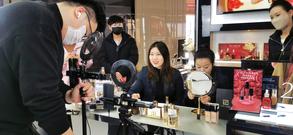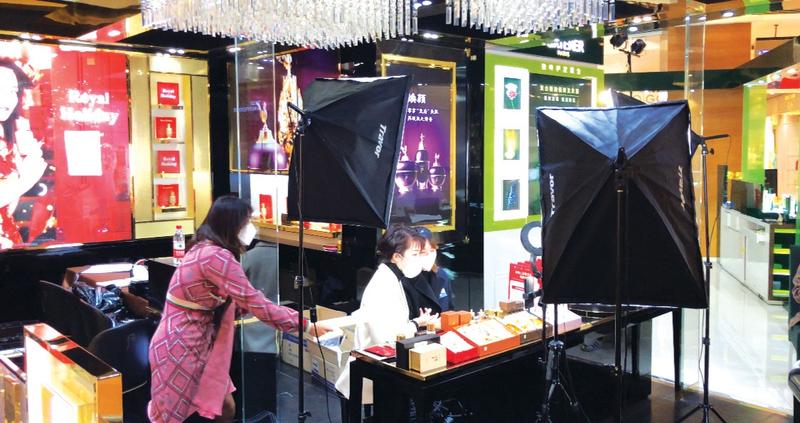Shenzhen malls adopt novel ways to overcome lackluster trade amid epidemic
 Salespeople representing cosmetics brands promote products through livestreaming at a chain shopping mall Maoye Commercial Co, on Huaqiang North Street in Shenzhen as the novel coronavirus has battered the retail sector in the city. (PHOTO PROVIDED TO CHINA DAILY)
Salespeople representing cosmetics brands promote products through livestreaming at a chain shopping mall Maoye Commercial Co, on Huaqiang North Street in Shenzhen as the novel coronavirus has battered the retail sector in the city. (PHOTO PROVIDED TO CHINA DAILY)
Inside an empty shopping mall in Shenzhen, a dog and pony show is under way. Under a beauty ring lamp, two retailers waste no time promoting a face cream in front of a mobile-phone screen as tens of thousands of customers stay tuned online.
The scene is in a store at chain shopping mall Maoye Commercial Co on Huaqiang North Street in Shenzhen. Its sales professionals are battling to turn the tide of a business slump, switching on lights and cameras.
Some 66 salespeople representing more than 30 brands, including cosmetics and clothing labels, joined our live-streaming sales events last week, drawing up to 100,000 viewers
Yang Zhiliang, e-commerce manager at Maoye Commercial Company
To curb the spread of the novel coronavirus, Shenzhen residents are advised to stay indoors as much as possible, precipitating a sharp decline in business at brick-and-mortar stores. Shopping malls have responded by taking to livestreaming and e-commerce to make it up.
About a dozen prominent shopping malls, including AT Mall, Rainbow Department Store and BHC Outlets, have been telling their salespeople to invite brand members to WeChat groups or livestream to keep themselves afloat.
“Some 66 salespeople representing more than 30 brands, including cosmetics and clothing labels, joined our live-streaming sales events last week, drawing up to 100,000 viewers,” said Yang Zhiliang, an e-commerce manager at Maoye.
“Our mall used to have some 30,000 customers on average each day, but the number of online visitors to our livestreaming platform has now reached 20,000 daily. The online conversion rate is 10 to 15 percent higher,” he said.
Citing the livestreaming sales of cosmetics brand Whoo, Yang said it raked in about 300,000 yuan within two hours.
 Salespeople representing cosmetics brands promote products through livestreaming at a chain shopping mall Maoye Commercial Co, on Huaqiang North Street in Shenzhen as the novel coronavirus has battered the retail sector in the city. (PHOTO PROVIDED TO CHINA DAILY)
Salespeople representing cosmetics brands promote products through livestreaming at a chain shopping mall Maoye Commercial Co, on Huaqiang North Street in Shenzhen as the novel coronavirus has battered the retail sector in the city. (PHOTO PROVIDED TO CHINA DAILY)
Taking into consideration these salespeople are not professional key opinion leaders (KOL), he believes there’s still much room for growth.
“Live-streaming could bring on-site service experience close to long-distance customers, who’re usually not our target customers in the past,” Yang said. Thus, there’s an opportunity for a comprehensive upgrade of the mall to an integrated offline-online operation.
Before the epidemic, the shopping complex had set up an e-commerce platform, but Yang said it focused only on cosmetics products. It expanded to all product categories soon after the epidemic erupted.
 Salespeople representing cosmetics brands promote products through livestreaming at a chain shopping mall Maoye Commercial Co, on Huaqiang North Street in Shenzhen as the novel coronavirus has battered the retail sector in the city. (PHOTO PROVIDED TO CHINA DAILY)
Salespeople representing cosmetics brands promote products through livestreaming at a chain shopping mall Maoye Commercial Co, on Huaqiang North Street in Shenzhen as the novel coronavirus has battered the retail sector in the city. (PHOTO PROVIDED TO CHINA DAILY)
He said sales at their online store have lately soared by 66 percent, compared with the same period last year, and is confident it will become a more effective sales platform than offline stores after the epidemic is over.
Chen Xi, a consumer, said live-streaming and WeChat group sales have helped to kill her boredom at home.
“I’ve met most of these salespeople and visited their brand stores, so I trust them and they offer me big discounts this time,” she said.
Rainbow Department Store has been organizing at least 50 live-streaming events a day, bringing in revenues of up to 80,000 yuan on each occasion, according to a Shenzhen Evening News report.


